General
Decentralisation – A Condition, Process or Mystery?
Published
9 years agoon
Decentralisation is a term that has been flung around governance circles so frequently that the last thing you would expect to find is an almost-packed Makerere University Main Hall in the midst the busy season of tests. On 4th November 2014, the University Forum on Governance (UNIFOG) in partnership with the Konrad-Adenauer-Stiftung (KAS) organized a panel discussion on Seventeen Years of Decentralisation: Opportunities, Challenges and Outlook for Uganda and at the close of the day, the audience left with a greater sense of appreciation of what they thought they knew but actually knew not.
“Konrad-Adenauer-Stiftung’s interest in decentralisation in Uganda stems from our own political background where Germany’s decentralised system of governance was established in 1949 by the Allied Forces after World War II. Nevertheless Federalism has turned out to be the most valuable assets to Germany for on the good side it has increased accountability but on the negative side, slowed down legislation” said Ms. Maike Messerschmidt, KAS’ Programme Officer for Uganda and South Sudan in her introductory remarks.
KAS’ activities in Uganda are focused on strengthening the multiparty democratic system through the promotion of good governance and leadership. Ms. Messerschmidt noted that decentralisation as a process of redistributing power from the centre plays a crucial role in the development of any country and hoped that the day’s panel discussion would greatly contribute to the ongoing debate on the same.
Any system that aspires to have nationwide impact ought to be supported in its operations by a cohesive force of both volunteers and societal leaders at all levels. As such, the Uganda Local Governments’ Association (ULGA) was established in 1994 as the National Association of Local Governments of Uganda; a private non-profit body. To review Uganda’s decentralisation framework as well as share challenges and opportunities the structures present, UNIFOG invited ULGA Secretary General Ms. Rose Gertrude Gamwera, whose presentation painted a vivid picture of the actual situation on the ground.
“Good afternoon Councilors” she greeted, with the audience reluctant to respond, thinking that maybe she was addressing the wrong forum. They would however soon learn that everyone above eighteen years is a Local Government Councilor and that the Village Council is the primary platform to promote citizen participation in democratic control and decision making, “you can see that you have already been given the opportunity at village level 1. It is time for you to take the reins and utilize that platform,” challenged Ms. Gamwera. She nevertheless noted that Decentralisation had empowered Local governments to build economic bases so as to become financially independent, “These structures have been empowered to come up with their own budgets, generate and collect more revenue and in addition to that, they receive a stipend through Central government transfers to run services, although I hasten to add that we are becoming more dependent on that.” Ms. Gamwera also noted that Local Government structures open up room for employment and provide an avenue for Government to conduct its oversight function on national programmes.
Decentralisation has however encountered its fair share of challenges, the biggest arising from the creation of new districts. “This resulted in increased Administrative costs and some local governments could just not be operationalised,” shared Ms. Gamwera. She also cited failure to effectively conduct elections due to high expenses associated with the process, low caliber of political leaders due to the absence of a minimum qualification limit, conflicts arising from different multiparty dispensations, and poor remuneration as challenges that continued to dog decentralisation. She however noted that Uganda’s decentralisation drive was progressing well despite these challenges “as long as we are committed, decisive and there is good will on the part of policy makers, decision makers and implementers, we can make it” she resolved.
With the audience now fully aware of what was on the ground, Dr. Yasin Olum, an Associate Professor of Political Science and Public Administration, CHUSS presented the academic side with the aim of providing possible policy options to improve the decentralisation system. Starting off with the concept and theory of decentralisation, Dr. Olum questioned “Is it a condition or a process? There are those that see it as a process and others as a condition, which presents us with an area for debate” said Dr. Olum. Touching on the forms of decentralisation, he also pondered which one was most suitable for Uganda, “is it De-concentration, Devolution, Delegation or even a fourth which is subject to contest-Privatization”
Dr. Olum further expounded on the three theories of decentralisation as; Liberal, Public Choice-the views of economists on decentralized state and Marxist-the analysis of the state at the local level. “From my assessment, Uganda seems to be unconsciously implementing decentralisation by applying either the liberal and partly the public choice and not the Marxist” he noted. He however suggested that the Marxist theory be used to understand and propose an alternative to Uganda’s decentralisation because the practices as shared by ULGA necessitated that decentralisation be located in a much wider economic and political setting in which Local Governments are situated.
Examining the methodological issues of understanding decentralisation, Dr. Olum noted that the terms centralization and decentralisation had left nation like Uganda that practices a mix of both with no middle term to describe the present situation. He further noted that the absence of indices to measure the efficacy of certain practices presented a challenge. “How do you measure decentralized power? There is a tendency to compare two different countries simply because they are implementing decentralisation or indeed comparing one country based on a single time period as if these different eras at the time of comparison are the same. I think we need to be a little bit careful” he advised. He also noted a problem of differential deficiencies-the difficulty in differentiating the degrees of decentralisation within a single country at a given time. “Are the districts being compared the same in terms of resources or geographical size?” he pondered in a bid to further clarify his point.
In an analysis of the conditions for successful implementation of decentralisation, Dr. Olum asked participants to ponder whether the spaces created for citizen participation were actual or pseudo and furthermore reflect upon whether there was political and civil will for decentralisation at the various levels. “Do leaders have the commitment to participate simply because you have established the structures or would they rather engage in their own activities and not go to this forum?” asked Dr. Olum. He further warned all stakeholders not to “romanticize decentralisation as if it was the best thing that ever happened.” With regard to proposing possible policy option, Dr. Olum agitated for the political-economy approach that guaranteed a clear understanding of the local, national and international terrains in which decentralisation is supposed to operate.
He called for an examination of the ecological surroundings that addresses inequalities in urban and rural areas to enhance the construction of local democratic states. “We should also look at the political constraints that may affect the process of governance. We are in the era of corporatization and so we have to be very careful if we are to talk about decentralisation in a climate where the country is emphasizing marketization and corporatization.” He stressed the need to conduct empirical research on decentralisation of power with a view of unearthing whether it has led to a change in the behavior of actors rather than the formal organisational relationships. “We need to ask; has decentralisation made people better, has it changed their behavior or are they still living as the centralized?” pondered Dr. Olum.
The historical perspective of any matter always provides valuable input into any debate. Contributing to the discussion, Dr. Simba Kayunga Ssali, Lecturer-Department of Political Science, CHUSS noted that “When you look at the history of centre-local government relations, an interesting phase could be traced to the early 1940s when the British Government started the so-called indirect rule. Any good student of Uganda’s centre-local government relations will note that Uganda was operating a very detailed decentralized system of government between 1955 and 1965.” Dr. Simba decried the lack of willingness by the current policy makers and implementers to examine the challenges faced by decentralisation then so as to better implement it today.
He supported Dr. Olum’s proposal to use the Marxist theory to better evaluate the notion that the cause of underdevelopment is over-centralization Dr. Simba noted that “Decentralisation understood the causes of underdevelopment from an organisational perspective; that we were underdeveloped because of our internal crises, hence excluding the global factors which have led us into poverty” he said, further adding “And as long as we carry on with a development paradigm which excludes our global connections, that paradigm cannot lead us into economic transformation.” Dr. Simba however took difference to the earlier suggestion that low levels of education were a hindrance to effective service delivery. Quoting from the 17th Century French revolution, Dr. Simba observed that “’There is no correlation between high attainance of education and sensitivity to people’s needs.’ The fact that you are more educated does not mean that you are more sensitive to the needs of the people” summed up Dr. Simba.
The notion of decentralisation as an answer to underdevelopment once again resurfaced in the panel discussion when Dr. Sarah Ssali, Senior Lecturer-Department of Women and Gender Studies, CHUSS took to the podium. “Were the donors thinking the same thing when they pushed decentralisation as a conditionality for aid and as a way of reducing the powers of the state to impact on the local level?” she pondered. She also wondered whether the politicians and donors were posing these questions from the same source of inspiration and whether the eventual beneficiary community did not just see it as another opportunity to secure jobs for their children. “My considered opinion is that we are talking about different things although they are all thoughts about decentralisation as a system of governance” she added.
Evaluating the progresses and regresses as a result of decentralisation, Dr. Ssali noted that “All those who have looked at service sectors of health and education have come up with simple before and after study reports and no one is wondering where funding to put up these buildings is coming from! If you can find a building that has been put up by the district I think you will be very lucky” she challenged. She observed that most of the infrastructure had been developed as a result of conditional grants from government or partnerships with other donors. Still in line with finance and revenue, Dr. Ssali noted that “85% of district revenues come from the centre in form of conditional grants and no district; apart from Kampala can raise more than 5% of its revenue, implying that they are all dependent on the centre.” She therefore wondered whether we were talking about actual decentralisation as a country.
She also called for an evaluation of the distinct gap in knowledge and skills between the highly-educated technocrats who run the districts and lower qualified leaders who constitute the councils “And so you are promoting the elite capture from the urban to the rural areas. But elite capture is not just about educated people because we have the rural elite who are likely to secure the position by virtue of their family status. Will these then relate with people for purposes of self aggrandizement or will they work for public good?” she wondered out loud. She noted that this could lead to a perpetual source of disappointment between councilors and their electorate. In conclusion she noted that whereas decentralisation had created an opportunity for several players other than that state to contribute to political debate, it had also provided a way for donors to directly access the people thereby leading to a question of who actually owned and run the process.
The day’s moderator Mr. Maurice Mugisha-Nation Media Group (NMG) then opened up the debate to members of the audience. Contributors then raised issues ranging from; structures without actual power at decentralized levels, the high cost of public administration especially at newly created districts, political differences interfering service delivery due to lack of consensus, the absence of sound revenue bases implying that districts implemented very little of planned projects, all the way to lack of substantively appointed officials at the District level. In the responses that followed, Ms. Gamwera noted that ULGA and the government are coming up with statutory instruments to complement the Local Government framework and help implement devolution of power and capacity building for Local Government leaders. She also noted that interviews were ongoing to recruit Chief Administrative Officers to fill the vacant positions at Districts. Dr. Sarah Ssali noted that decentralisation had empowered people to demand for accountability despite the fact that their power to implement is hampered by delayed transfer of resources from the centre and lack of capacity to raise their own revenue.
With regard to the evaluating the level of decentralisation of power, Dr. Yasin Olum advised assessors to examine the extent of either De-concentration, Devolution or Delegation of power in the Financial, Political and Personnel aspects of governance. He urged participants not to look at either centralization or decentralisation as the cause of underdevelopment but rather consider other global factors. Regarding the complexities presented by multi-ethnic districts in that there was no unifying local language to guide debates, Dr. Simba Ssali noted that knowledge or lack of knowledge of the English language had no bearing whatsoever of one’s being knowledgeable or not; emphasizing that knowledge existed outside formal education systems. He urged Local Government Authorities to localize decentralisation concepts so as to prevent all attempts at programme implementation being shunned as elitist by rural populations.
At the conclusion of the session, UNIFOG’s Executive Secretary Mr. Bruce Kabaasa thanked all the panelists and participants for the lively debate, “I want to encourage you to pay as much attention as possible and also look forward to many such debates in the future in order to broaden your knowledge of the very issues that surround us in society,” he said. Mr. Kabaasa also thanked Konrad-Adenauer-Stiftung for not only going beyond their original scope and supporting more engagements than initially agreed upon but also promising to make future engagements more engaging. He prayed that all stakeholders would continue to find these panel discussions as valuable avenues of knowledge generation and sharing.
Article by Public Relations Office
You may like
General
Mak DARP Project Launch to Revolutionise Management of Academic Records
Published
22 hours agoon
April 22, 2024By
Mak Editor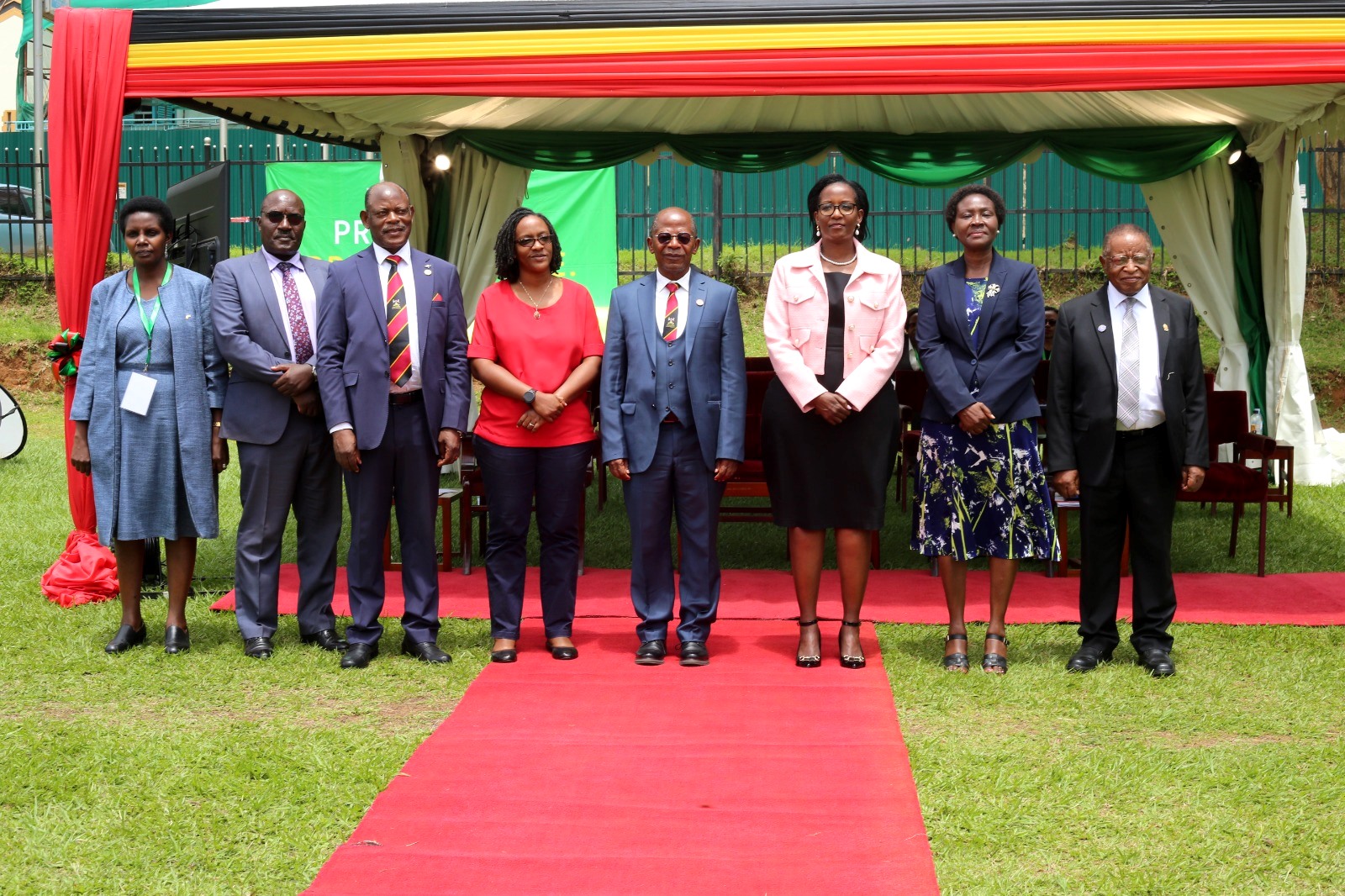
By Ritah Namisango
“This initiative, funded by the Government of Uganda through Makerere University Research and Innovations Fund in partnership with the Mastercard Foundation, represents a significant step forward in our efforts to modernize and digitalize our academic processes. It’s therefore with great pleasure and pride that I launch the Digitalization of Academic Records and Processes project at Makerere University, and I commission the Registry of Students’ Records and the Archive of Students’ Records,” stated the Minister of Education and Sports, Hon. Janet Kataaha Museveni represented by the State Minister for Higher Education, Hon. John C. Muyingo.
As the world continually evolves from manual and traditional methods of records management to modern and digitalized processes, Makerere University launched the Digitalization of Academic Records and Processes (DARP) project to ease the storage, retrieval and acquisition of academic documents by her stakeholders.
The project has digitalized records and implemented new processes as well as established a digital state-of-the-art storage facility at the Senate Building to securely store university academic documents. The digitization process comes along with a university policy that guides on how to record, manage, retrieve and dispose of records not in use. This project is designed to reduce on the substantial amount of space that paper storage systems occupy as well as safeguard records from disasters like fire.
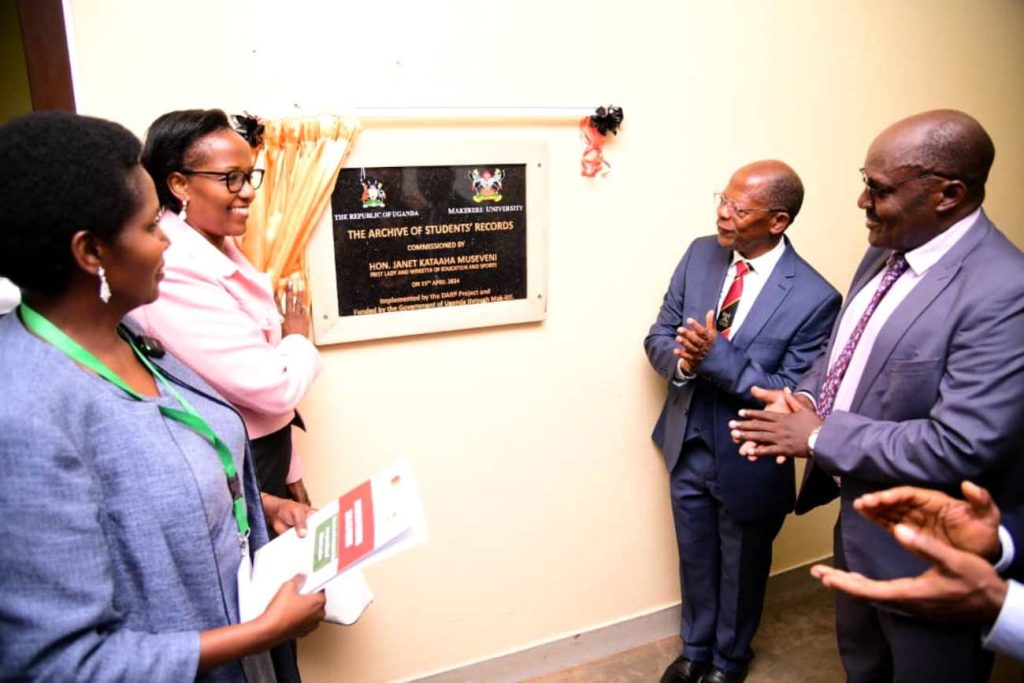
Officiating at the launch of the DARP project on Friday 19th April, 2024 at Makerere University Freedom Square, Hon. John C. Muyingo, affirmed on behalf of Hon. Janet Kataaha Museveni that the launch was a significant milestone in the history of Makerere University.
The Education and Sports Minister further noted that in today’s fast-paced world, universities must manage massive amounts of academic information, and efficient record keeping necessitates that the information is accurate, accessible and secure, benefiting both the institution and its stakeholders. She noted that the DARP system would streamline the processes of managing and accessing academic records, resulting in significant timesaving for students and other stakeholders at the university and beyond.
“Digitalization of academic records and processes is an innovation set to revolutionize the way records are managed by addressing pressing public concerns such as efficiency, security, integrity and accessibility as well as eliminating the unnecessary delays in the processes. The traditional manual approach, while effective in its time has become increasingly challenging to sustain in this digital world, therefore, digitalizing academic records and processes provide crucial responses to the monotonous questions that the outdated manual system never addressed,” stated the Minister’s speech.
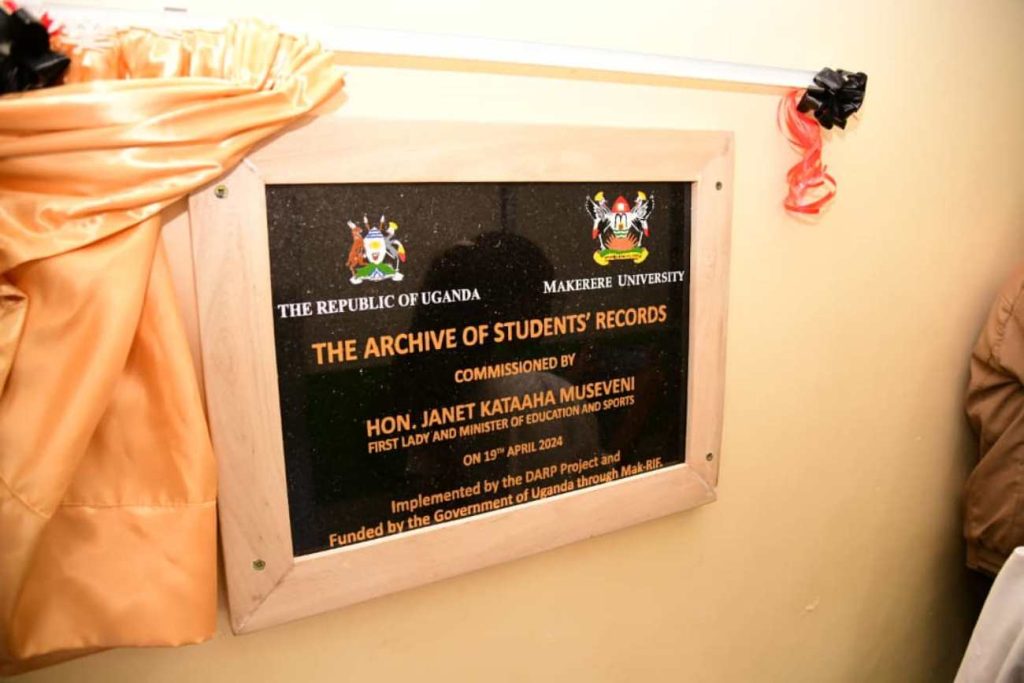
Having outlined the challenges and risks that the traditional paper-based record keeping systems present such as the storage space factor, the risk of mixing active and inactive records, the high rate of wear and tear as well as vulnerability to manipulation of records, the Minister commended Makerere University on the enviable track record of efficiently managing and securely storing its academic documents, Senate minutes, curricula, examination results and students files for nearly a century, despite political upheavals and other challenges.
She observed that digitalized systems would make academic records more accessible to the students and eliminate the frustration of delays caused by bureaucratic inefficiencies and the outdated paper system, enabling them to timely take the necessary steps in academic and professional progression.
As the University embarked on its journey of digital transformation, Hon. Janet Kataaha Museveni equally applauded Makerere for continuously upholding its commitment to academic excellence, research and innovation. She advised the fraternity to stay committed to the principles of innovation and inclusiveness that define the University. As such, she urged them to embrace the digital transformation wholeheartedly so as to harness the power of technology and enable Makerere University to remain a beacon of excellence in the academic world.
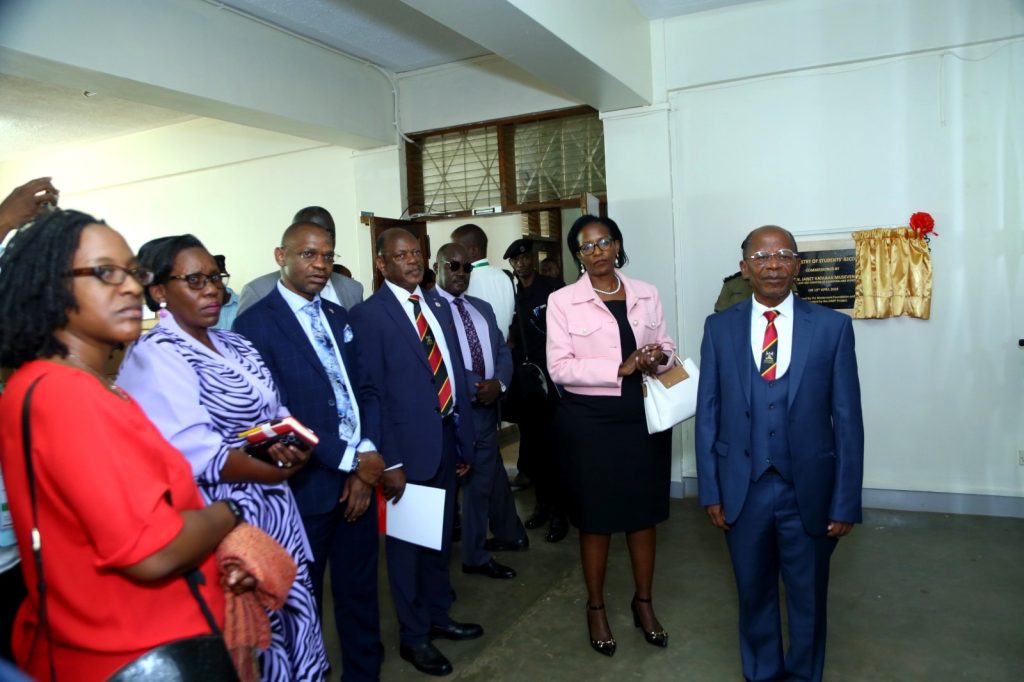
“Since its establishment in 1922, Makerere University has been a beacon of knowledge and learning, shaping the minds of generations of students and contributing significantly to the development of our nation, Africa and the world at large. Thank you for these brains. Your hard work, expertise, and dedication were instrumental in building this DARP project to realization. I am confident that you will have a lasting and positive impact on this university and the entire education sector, not only in Uganda, but the entire world,” said Hon. Janet Museveni.
The First Lady expressed her gratitude for the partnership with Mastercard Foundation and the support it renders in advancing education and innovation at Makerere University.
The Vice Chancellor, Prof. Barnabas Nawangwe highlighted that the launch of the DARP project was not only a landmark achievement for Makerere University, but also a confirmation of the importance that the University Council and Management attach to the role that digitalization and e-services play in implementation of the University strategic plan that continually strives for a professionally managed university.
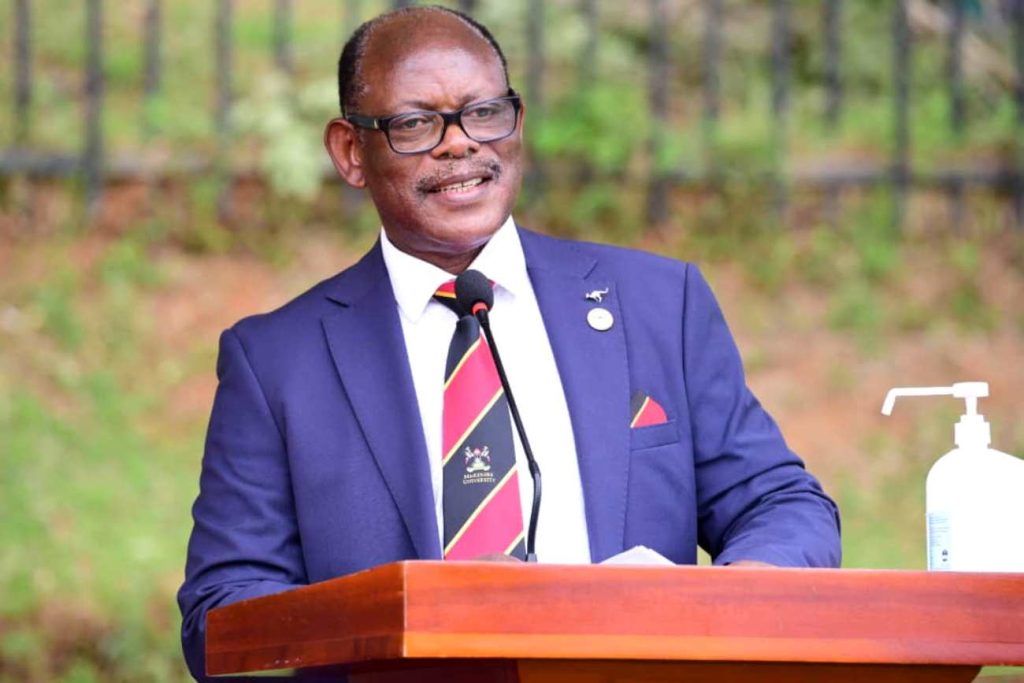
The Vice Chancellor revealed that the official launch of the DARP Project, undertaken in-house by a hardworking team of University staff, was a financial gain on the part of the University and an additional asset in the quest to improve efficiency and effectiveness as far as the University academic records and processes are concerned.
“Our current drive has been the continued digitalization of various business processes and services so as to be more responsive to the dynamic needs of our students, staff and stakeholders. We have been able to achieve this through intentional development of our in-house information systems development capacity, which has saved us a lot of funds in terms of initial purchase as well as annual license renewal costs,” said the Vice Chancellor.
Prof. Nawangwe stated that the DARP project has greatly contributed to the timely and improved service delivery to students and clients. He added that the ultimate goal is to enable students download their own transcripts without need for elaborate physical processes at the university.
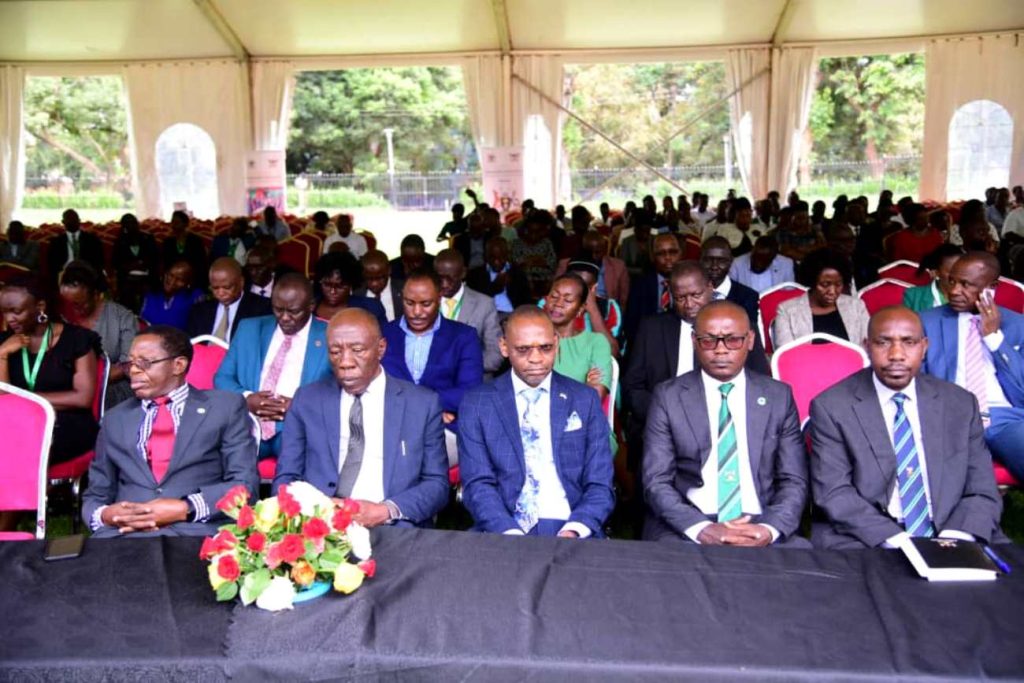
“During the 74th graduation ceremony, Makerere University was able to issue academic transcripts to qualifying students before graduation. I am pleased to inform you that we succeeded in issuing of academic transcripts before the graduation date because of the DARP project, which we are launching today. With the digitalization of students’ academic records, the University is now in a better position to provide the required information and data on time,” said the Vice Chancellor.
Prof. Nawangwe elaborated that Makerere, being Uganda’s Premier University has been a major beneficiary of several initiatives aimed at improving ICT infrastructure and connectivity. He added that the University has been able to achieve this largely due to the generous donations of the Government of Uganda and other development partners. He thanked His Excellency Yoweri Kaguta Museveni, the President of Uganda whose support led to the creation of the Research and Innovations Fund (Mak-RIF) in the 2019/2020 financial year with initial funding of UGX 30 Billion.
He revealed that the funding has continued to be availed throughout the last five financial years, which is clear demonstration that the Government of Uganda esteems Research and Innovation as catalysts to Uganda’s continued march from a peasant to a modern and prosperous country.
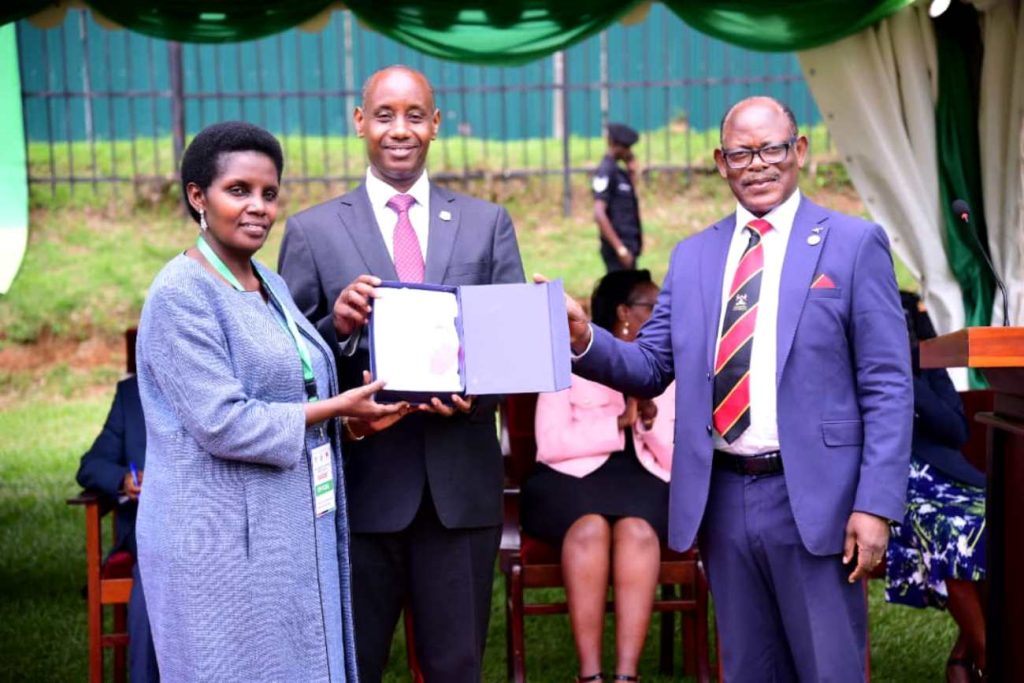
“I am proud to say that Mak-RIF has transformed Makerere’s academic and research landscape tremendously. Over the last five Financial Years, we have worked with other key stakeholders including Government ministries, institutions, agencies, organizations, and the private sector. Together, we have continued to increase the local generation of translatable research and scalable innovations that address key gaps required to drive Uganda’s development agenda, especially the un-funded priorities” stated Prof. Nawangwe.
In the same spirit, the Vice Chancellor applauded the Principal Investigator and Team Leader DARP, Mrs. Patience Rubabinda Mushengyezi and all the Team Members for the hard work that has improved the status of academic records and processes from manual processes to e-services. The DARP project is a collaboration between the Academic Registrar’s Department, College of Education and Externals Studies (CEES), College of Computing and Information Sciences (CoCIS) and the Directorate of Information and Communication Technology Support (DICTS). The DARP Project team includes: Prof. Betty Ezati, Dr. Peace Tumuheki, Dr. David Luyombya, Dr. Joyce Bukirwa, Ms. Ruth Iteu Eyoku, Mr. Juma Katongole, Mr. Joshua Muhumuza and Mr. Lubowa Gyaviira.
The Vice Chancellor also thanked the Makerere University Research and Innovations Fund (Mak-RIF) and the Mastercard Foundation for supporting different phases of the DARP Project.
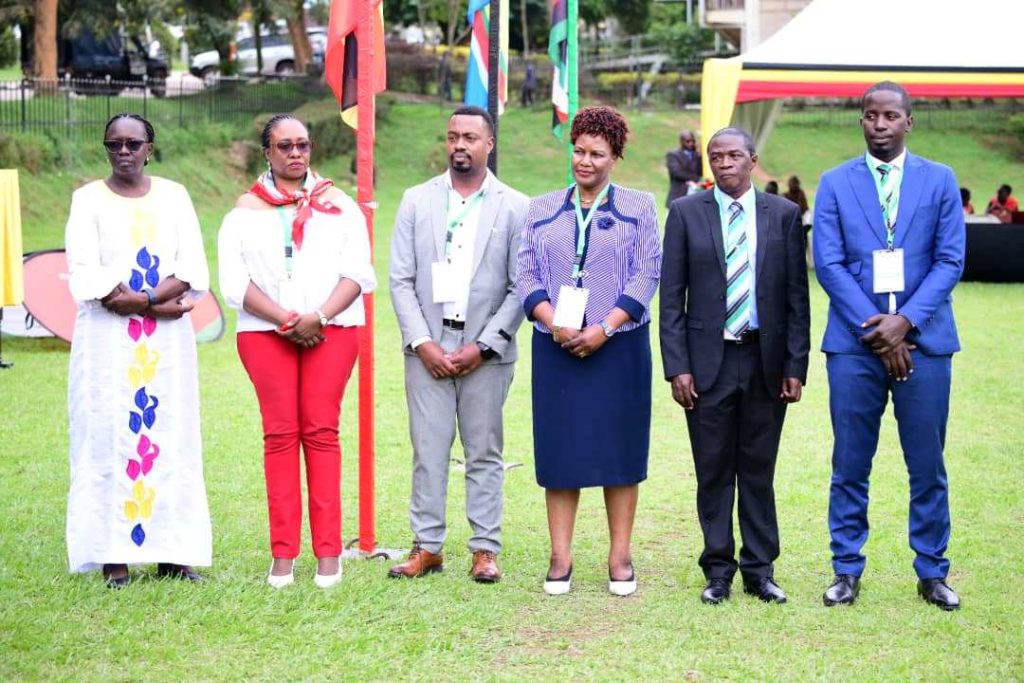
Mrs. Lorna Magara, the Chairperson of Makerere University Council acknowledged that launching the DARP project at Makerere University marked a significant step forward in digitalizing higher education services. She underscored that the transformational power of digitalization could not be overstated. She stated that by implementing an Academic Records Management System, the University would streamline the tracking and retrieval of academic files and establish a robust platform for digital certification and record verification.
“In an era where credential fraud poses a significant challenge, the DARP Project reinforces transparency, trust, and confidence in our academic processes. It is testament to our commitment to excellence. The DARP Project heralds a new era; one where our certificates and transcripts are shielded against increasingly sophisticated forgeries. By providing digitally verifiable academic documents, we empower employers worldwide to expedite verification procedures,” she articulated.
The Chairperson stated that Makerere University aims to create a dynamic and integrated learning environment with a goal to equip students with the skills and knowledge needed to thrive in an ever-evolving world. She emphasized the need to prioritize student-centeredness and adaptability which vision perfectly aligns with the DARP Project to ensure that the most deserving students can compete fairly in the job market alongside genuinely qualified candidates.
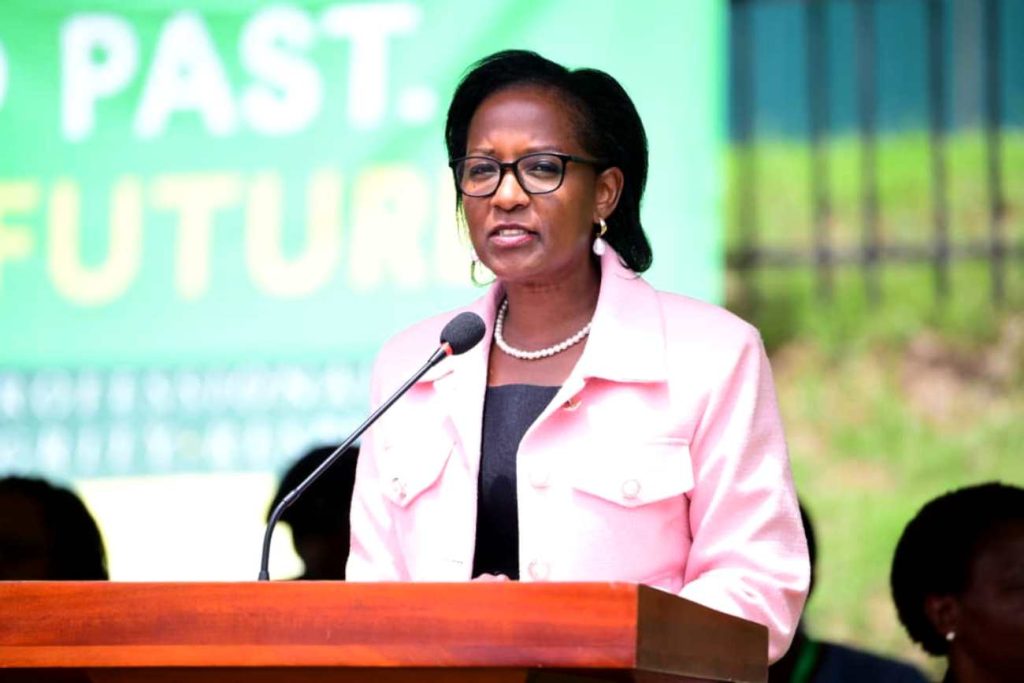
She advised that a system’s effectiveness hinges on the quality of input it receives, therefore, meticulous attention to detail is essential to ensure that the necessary information is accurately fed into the system to yield the expected outcomes. She recommended that vigilant effort has to be invested in ensuring quality processes in how the information is gathered and fed into the system, and the quality of persons tasked to do the work.
Mrs. Magara praised the DARP Principal Investigator for initiating the project in support of the University’s efforts to; address the critical element of maintaining integrity of academic records, significantly contributing to the University’s commitment to digitizing systems, and upgrading the process of archiving of records for ease in verification, certification, and retrieval.
She also extended appreciation to the Government of Uganda for the provision of funds through Mak-RIF, and to Mastercard Foundation for the provision of equipment and other support that will facilitate safe processing and storage of the academic documents.
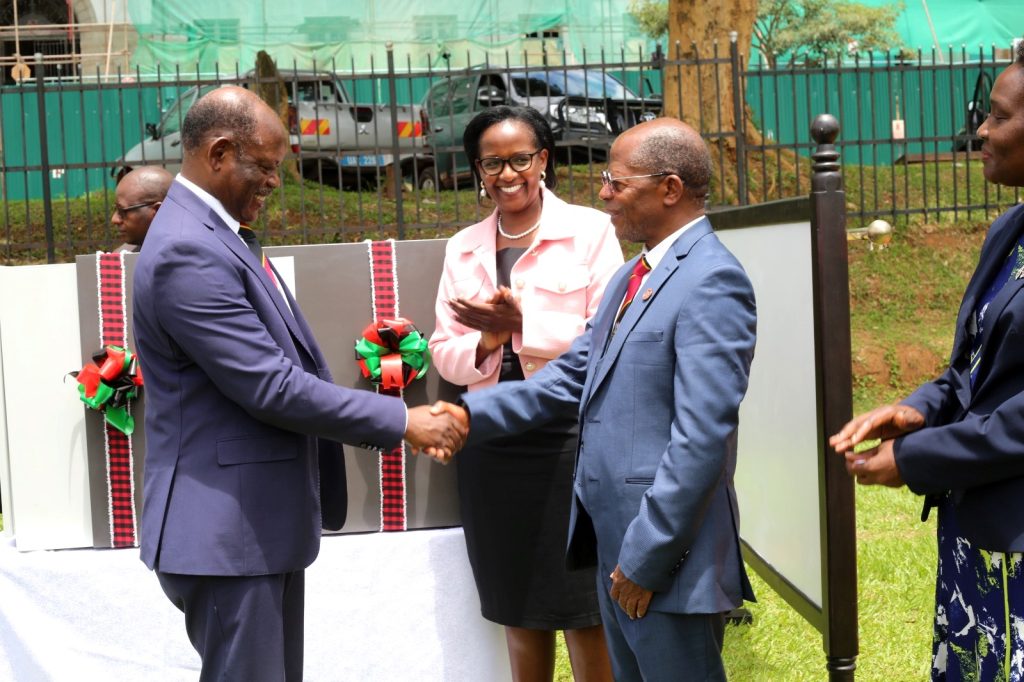
The Principal Investigator and Team Leader, DARP project, Mrs. Patience Rubabinda Mushengyezi proclaimed that the launch of the project was the birth of a new era in records management at Makerere University.
To enable the audience to understand and appreciate the situation before the DARP project, Mrs. Mushengyezi shared a documentary that highlighted the transformation from a purely manual process to a digital one. She added that the digitalization of student records from the 1980s changes the narrative of delays and long queues to fast, timely and friendly services to the students.
The Principal investigator disclosed that the DARP project team’s aspiration was to have the digitalization of students’ records rolled out in all the schools and colleges of the University. She observed that because of the hard work of the DARP team, they now have clear and well organized documents and the ‘ugly’ records shall never be seen again since they no longer exist. She expressed gladness that what started as a vision had become reality, culminating in the launch of the DARP project.
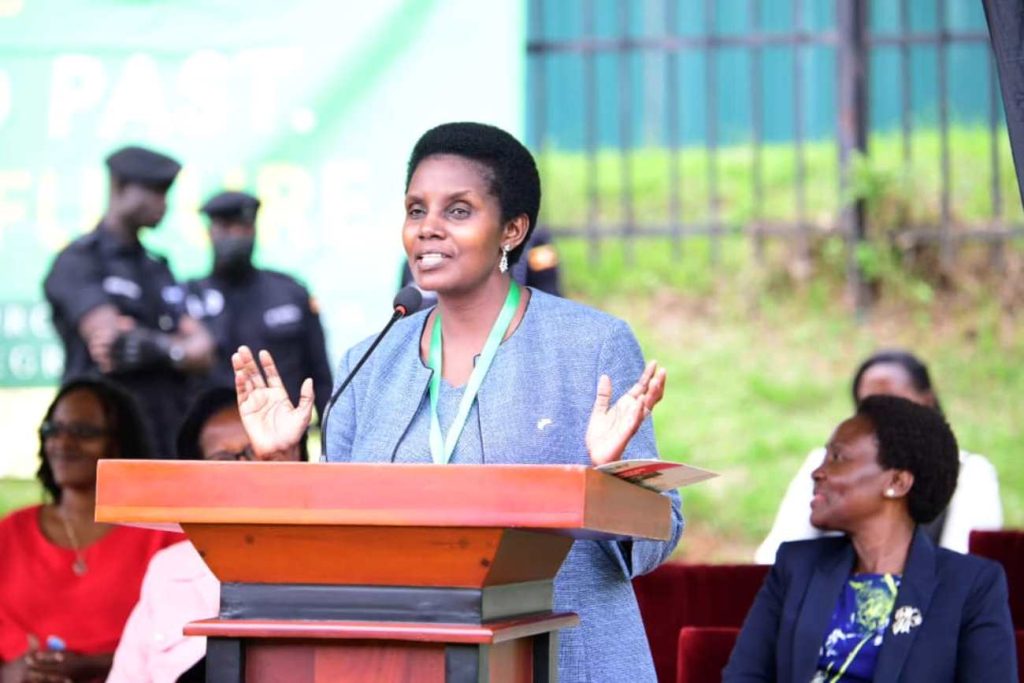
“Today, Makerere University is launching a new era of digital transformation in the management of students’ records and service delivery. We are changing the narrative of long queues, lengthy processes and we are now moving to efficient and digital services. We are here also to commission the registry of the students’ records and archive. The registry has been fitted with modern shelves with the capacity of storing over 30,000 students files but as we have seen, there is room for improvement and expansion. The archive has been fitted with modern shelves that have a capacity of storing over 100,000 students’ files and 21 wagons will store 170,000 students’ files,” Mrs. Mushengyezi declared.
Recalling the genesis of the DARP Project, Mrs. Mushengyezi shared that when the Government allocated support to the university’s research and innovations fund in 2019, she approached her colleagues and together, they submitted a project proposal. The project identified several challenges which were affecting records management at Makerere University namely; manual records handling, inadequate storage space, inadequate security for records, inexistent policy on records management, and lack of a system to streamline records management. The DARP project therefore set out to address these gaps with the ultimate goal of operating e-services.
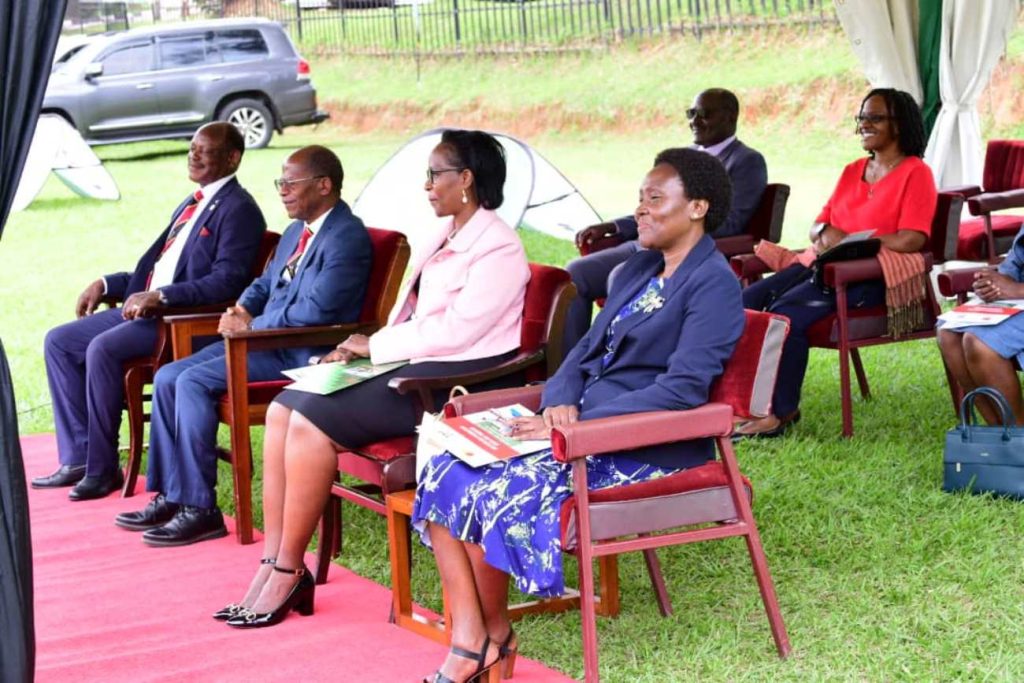
“The objectives of DARP Project were to digitalize academic processes including students’ files and examination results and other documents like senate minutes. We wished to establish a students’ records verification and certification Centre. We also wanted to use ICT to improve efficiency in conducting senate meetings and to archive existing manual documents into properly bound and referenced files. It has been a lot of hard work by the project team, but we have seen God’s hand in this transformational journey. I wish to say that we have achieved 95% of our objectives,” Mrs. Mushengyezi stated.
The Principal Investigator noted that the DARP project had created efficiency in the academic Registrar’s department with ability to generate reports on number of students by categories such as course, graduation cohort, academic disciplines i.e. Medicine, Law, Engineering etc., current enrolment and progression, as well as policies passed by the University Senate per year, and so on.
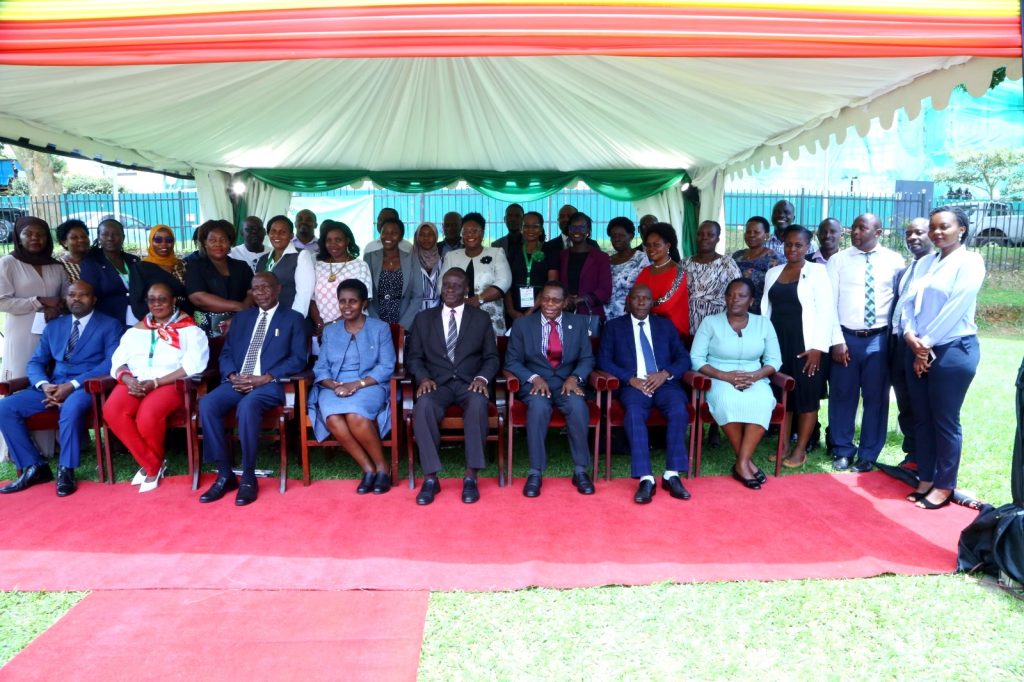
She thanked the Government of Uganda for funding the entire process by providing laptops, access control systems, CCTV cameras, printers, furniture, archival boxes, the 21 shelves, the wagons, stationery and facilitation of the entire team. She also thanked Mastercard Foundation for the support through the relief fund.
She appreciated the entire Makerere University Council and Management for the support rendered towards the establishment of the DARP project and for prioritizing the Project as a university programme. In a very special way, she acknowledged Prof. William Bazeyo, the former Deputy Vice Chancellor (Finance and Administration), Prof. Fred Masagazi Masaazi-Chairperson of Mak-RIF Grants Management Committee (GMC), Prof. Umar Kakumba, Deputy Vice Chancellor (Academic Affairs), Mr. Alfred Masikye Namoah, former Academic Registrar and the Academic Registrar, Prof. Buyinza Mukadasi, the University Secretary, Mr. Yusuf Kiranda, Deputy Registrars namely Mr. Charles Ssentongo and Mr. Tom Otim, for providing tireless support.
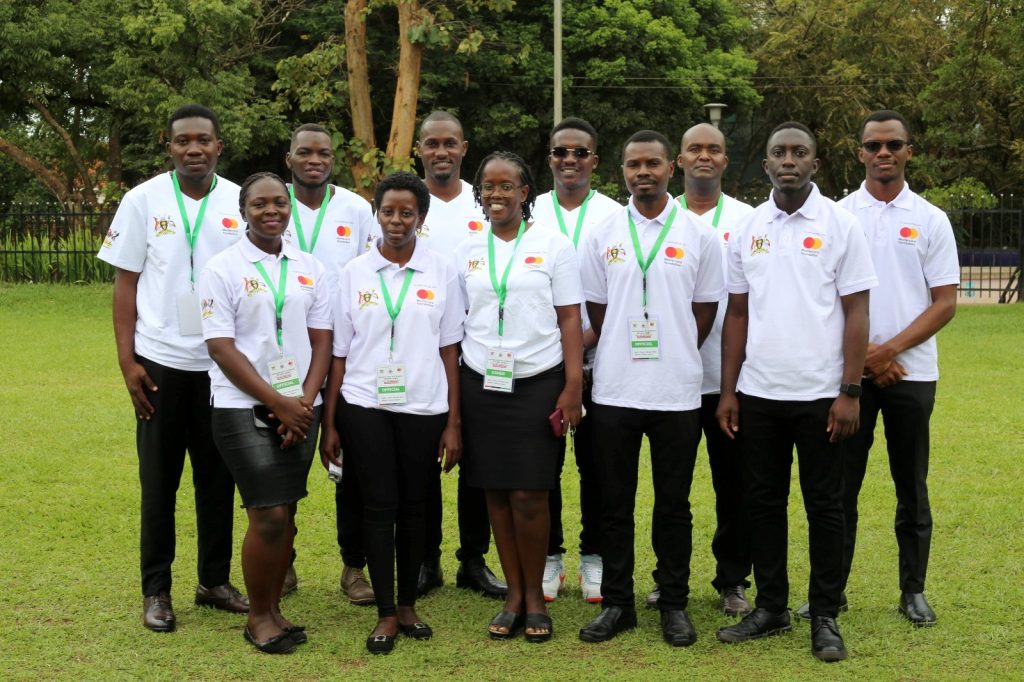
In addition, she recognized the supervisors in the Directorate of Research and Graduate namely Prof. Edward Bbaale and Ms. Prossie Nakayiki.
The Principal Investigator, Mrs. Mushengyezi also appreciated the members of staff whom she referred to as DARP Foot Soldiers for organizing, sorting and scanning the records.
In recognition of her selfless service and leadership, the DARP project team members through the Vice Chancellor, Prof. Barnabas Nawangwe presented Mrs. Patience Mushengyezi with a plaque and bouquet of flowers.
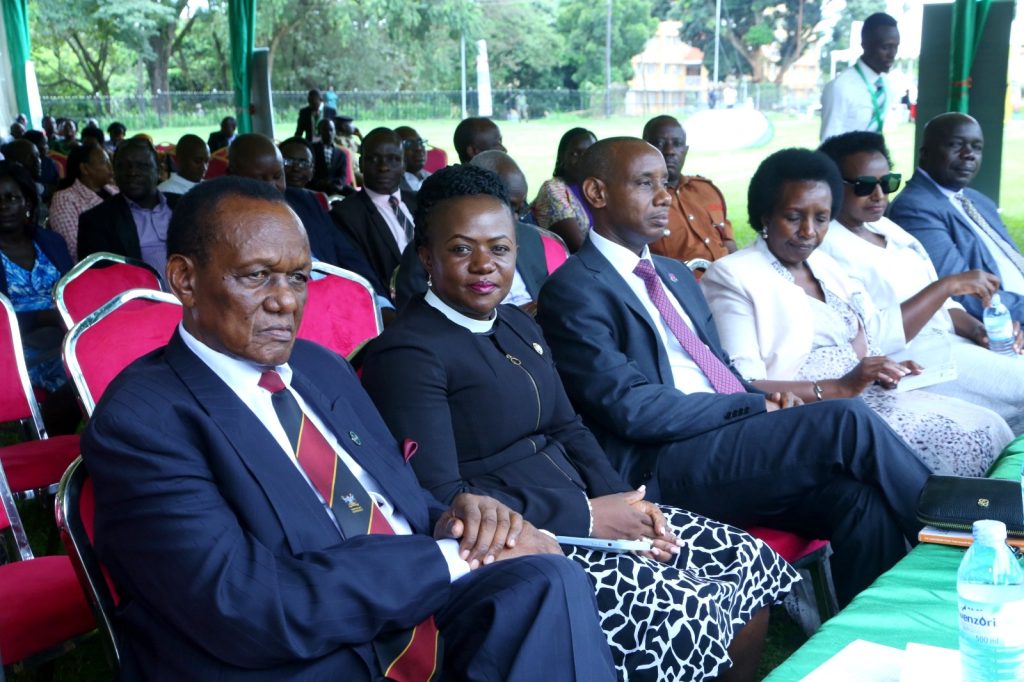
The DARP project launch was graced by the Chancellor Emeritus, Prof. Ezra Suruma, Members of Parliament, Vice Chancellors of other Universities, former Vice Chancellors, former Deputy Vice Chancellors in charge of Finance and Administration, the Makerere University Students’ Guild, and Mrs. Mushengyezi’s family. The Chaplain, St. Francis Chapel, Rev. Dr. Lydia Nsaale Kitayimbwa led the opening prayer while the event was moderated by Dr. Zahara Nampewo, the Deputy Principal of the School of Law and Ms. Ritah Namisango, Principal Public Relations Officer and Chairperson of the Protocol, Publicity and Media Sub-Committee for the launch. The Department of Performing Arts and Film was on hand to lead the anthems and keep the guests entertained.
General
Mak holds Mental Health Awareness Campaign for International Students
Published
22 hours agoon
April 22, 2024By
Mak Editor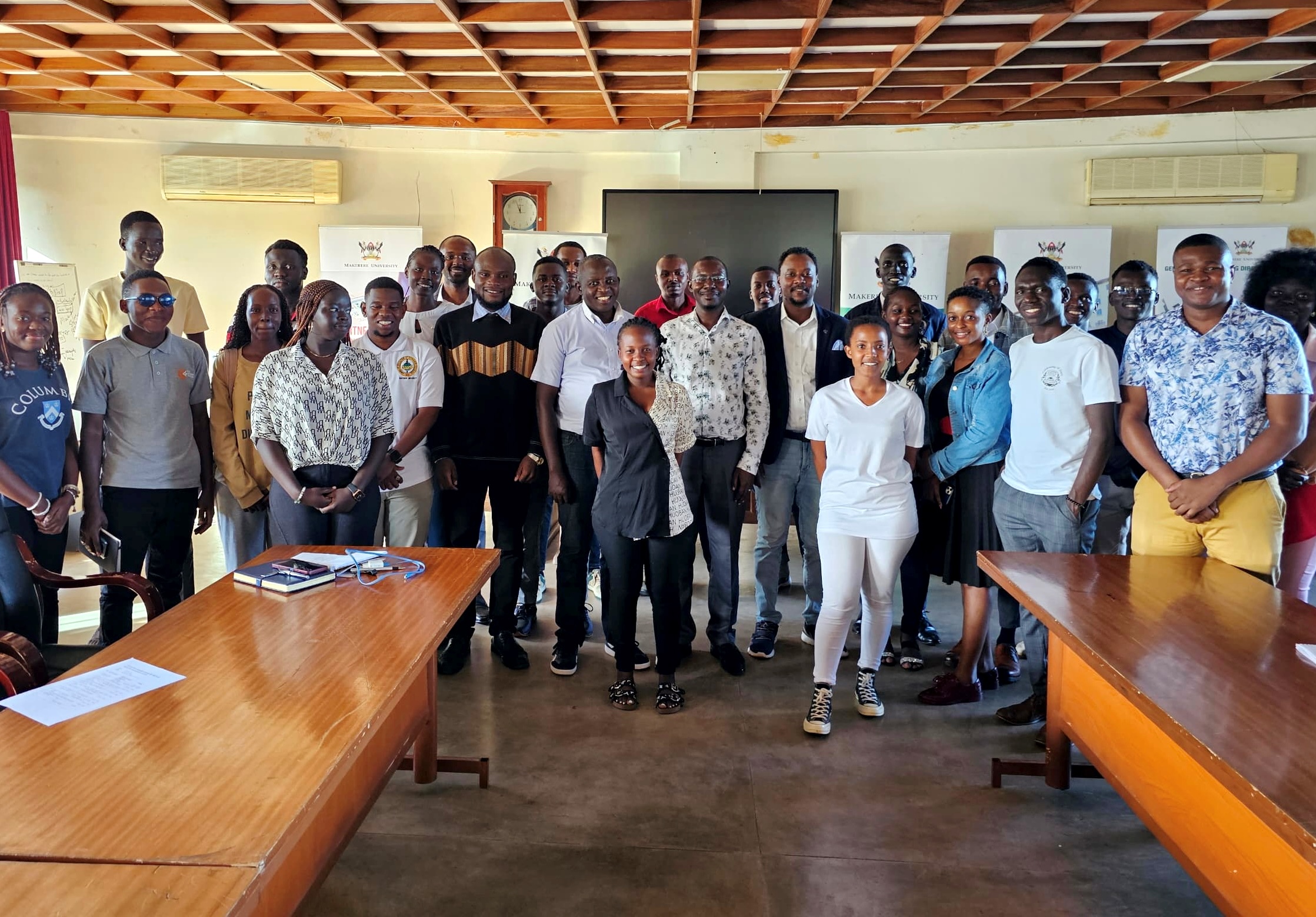
By Betty Nabisubi
On Friday 12th April 2024, over 100 international students convened at Makerere University to participate in the Mental Health Awareness Campaign organized by the International Students Union in partnership with the Counselling and Guidance Centre, International Office and Office of the Dean of Students.
The campaign, which included both physical and virtual participants, rallied international students to always ask for help. The annual event enables students to participate in engaging discussions, and provides a platform for them to openly share and address personal and academic challenges, both on and off campus.
The aim of holding a mental health awareness campaign for international students in the university is to promote mental well-being and provide support and resources for students facing mental health challenges. Furthermore, it seeks to raise awareness about common mental health issues, reduce stigma surrounding mental illness, and educate students on available mental health services and support networks. Additionally, it aims to empower students to recognize signs of distress, encourage help-seeking behavior, and foster a supportive and inclusive campus community where students feel comfortable discussing mental health concerns.
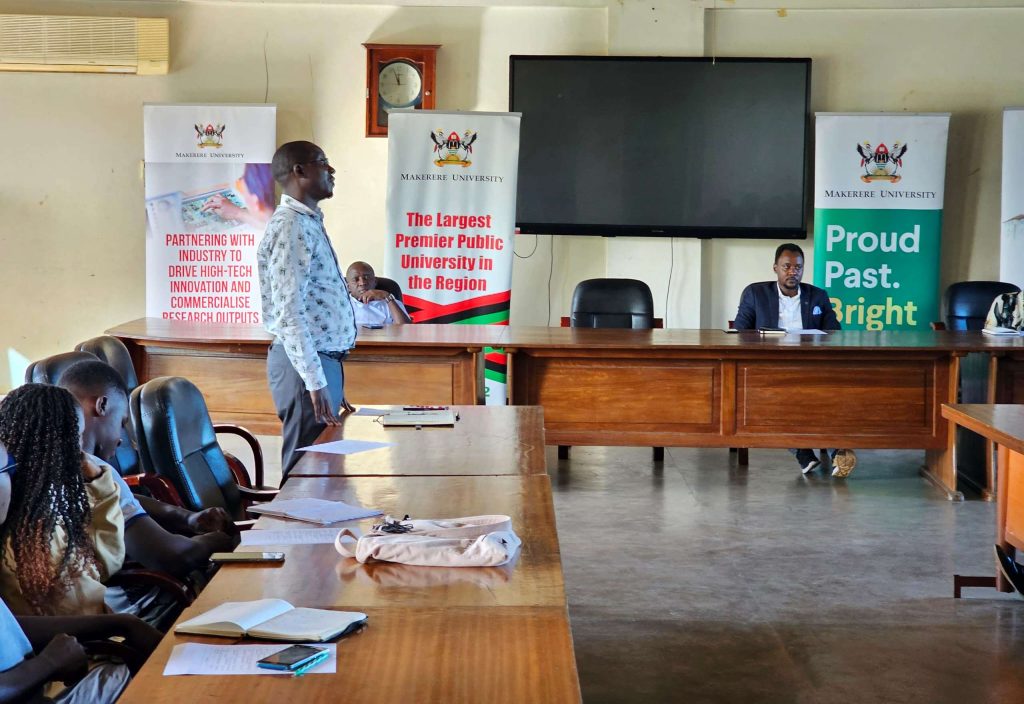
In line with the Mental Health Awareness Campaign theme; It is ok to ask for help, each Official urged the international students to seek guidance and support from the right offices and entities within the Makerere University system.
The Office of the Dean of Students represented by Mr. Peter Mwanja, Warden of University Hall emphasized the importance of students seeking help rather than isolating themselves in their hostels when faced with problems. He urged students to refrain from complaining about lack of assistance, but instead take action by speaking up when faced with challenges. Mr. Mwanja pledged to stand with the students throughout their academic journey so as to ensure that they have a fruitful stay at Makerere University.
In the same spirit, the Manager of the Makerere University Counselling and Guidance Centre, Mr. Henry Nsubuga called upon international students to utilize their services. He appealed to students to seek for help whenever they feel distressed.
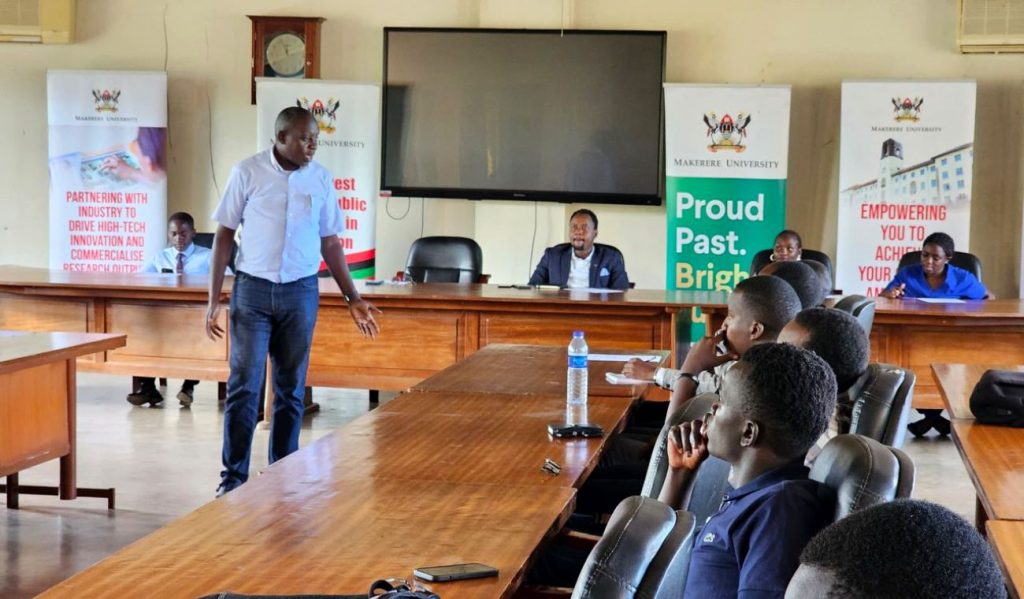
“Please come to the Centre when you need help. The Centre is ready to provide assistance upon any distress signal. I assure you that nobody will judge you for not being okay. We have professional counsellors who are willing to help,” remarked Mr. Nsubuga. The Makerere University Counselling and Guidance Centre is conveniently located at Plot 106, Mary Stuart Road, opposite Mary Stuart Hall.
Dr. Gardner Herbert from the Julius Nyerere Leadership Centre at Makerere University emphasized the importance of emotional intelligence, which encompasses the ability to understand, manage, and express one’s own emotions effectively, as well as to recognize and respond appropriately to the emotions of others. He highlighted the significance of students possessing skills such as self-awareness, self-regulation, social awareness, and relationship management.
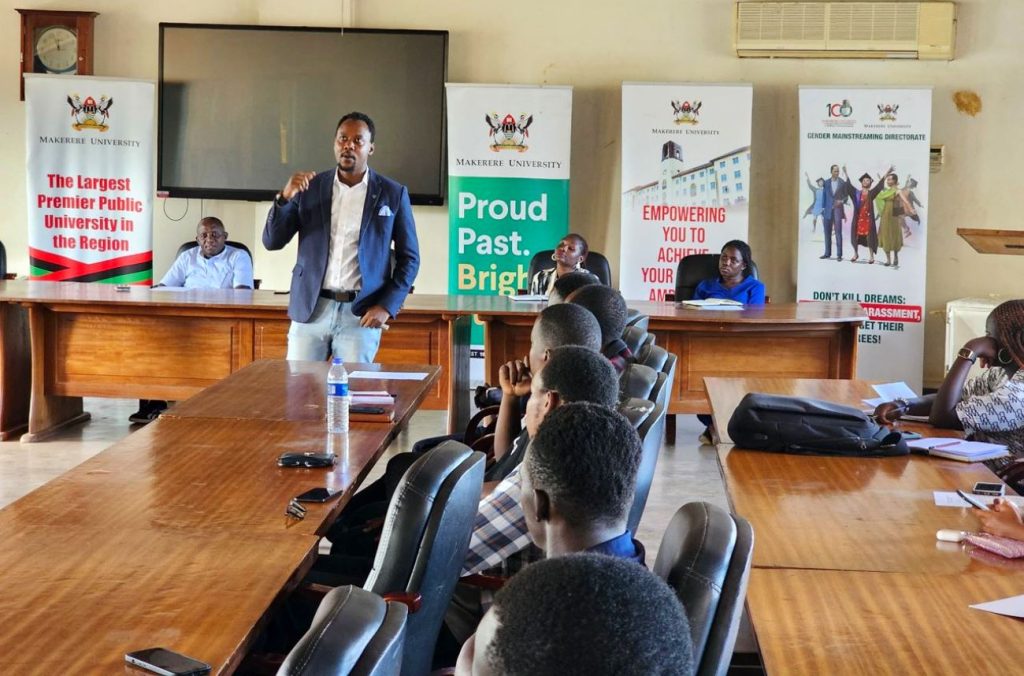
Self-awareness, he emphasized, serves as the foundation of emotional intelligence. This involves recognizing and understanding one’s own emotions, strengths, weaknesses, values, and motivations. Dr. Gardner explained that ndividuals with high self-awareness are better equipped to comprehend how their emotions influence their thoughts and behaviors, leading to more informed decision-making and greater self-control.
Mr. Gerald Ochwo on behalf of the Makerere University International Office encouraged the audience to visit the premises on Flat A5, Block A, Lincoln Flats for their mandate is anchored on ensuring that International students’ university experience is enriching. Furthermore, he emphasised the importance of students managing their visas proactively, instead of rushing to renew them either at the last minute or upon expiry. He pledged to organize more events to foster relationships among students.
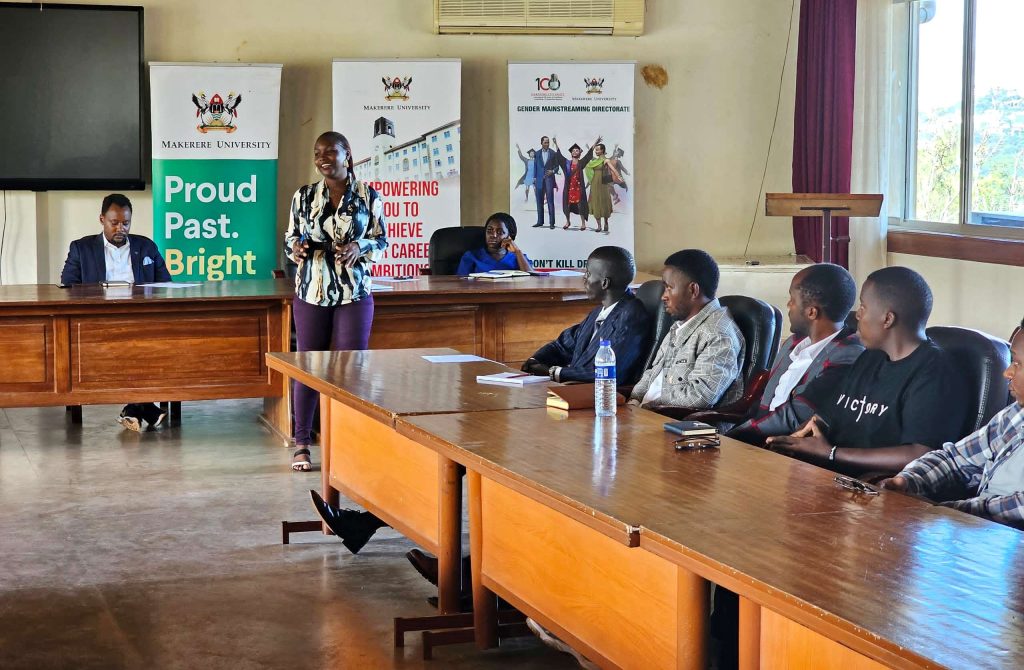
Focusing on nurturing a supportive environment for students away from home, the International Office invited Ms. Olivia Mwanje, a student of Makerere University pursuing a Master’s degree in Climate Change and Development at the College of Agricultural and Environmental Sciences to share a lived experience.
Ms. Mwanje was one of the beneficiaries of the exchange students’ programme to Utrecht University in the Netherlands. Her testimony served to demonstrate to international students that with dedication and sacrifice, it is possible to leave one’s home country, study abroad, and excel both academically and personally. She encouraged students to remain focused on their academic programmes despite the allure of other pursuits.
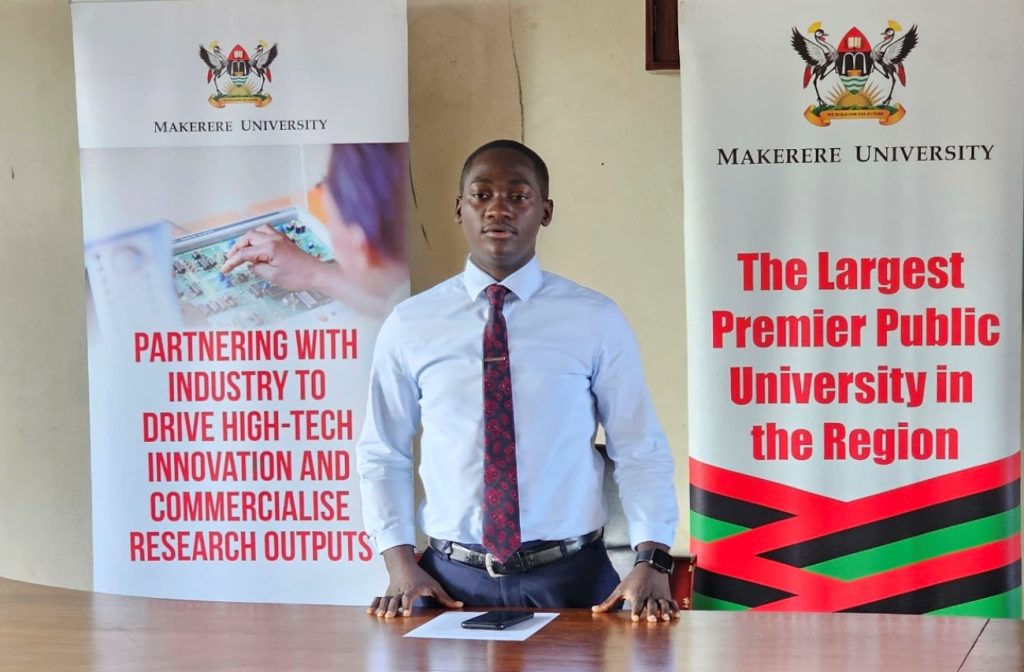
“I urge you, fellow students, to remain steadfast in your educational aspirations while exploring the opportunities available. Prioritize your academic goals over non-academic pursuits,” said Ms. Mwanje. She stressed that deviating from the primary objective leads to unintended consequences. For instance, she shared stories of students who abandoned their academic pursuits for menial jobs upon arrival abroad. Ms. Mwanje advised students to stay committed to their studies and, upon completion, pursue other non-academic endeavors if they so desire.
The Guild President, H.E. Vincent Lubega Nsamba expressed the Guild Leadership’s strong commitment to ensuring that international students have a comfortable stay at Makerere University. He encouraged international students to seek counselling whenever they feel distressed and emphasized the importance of talking to peers for support.
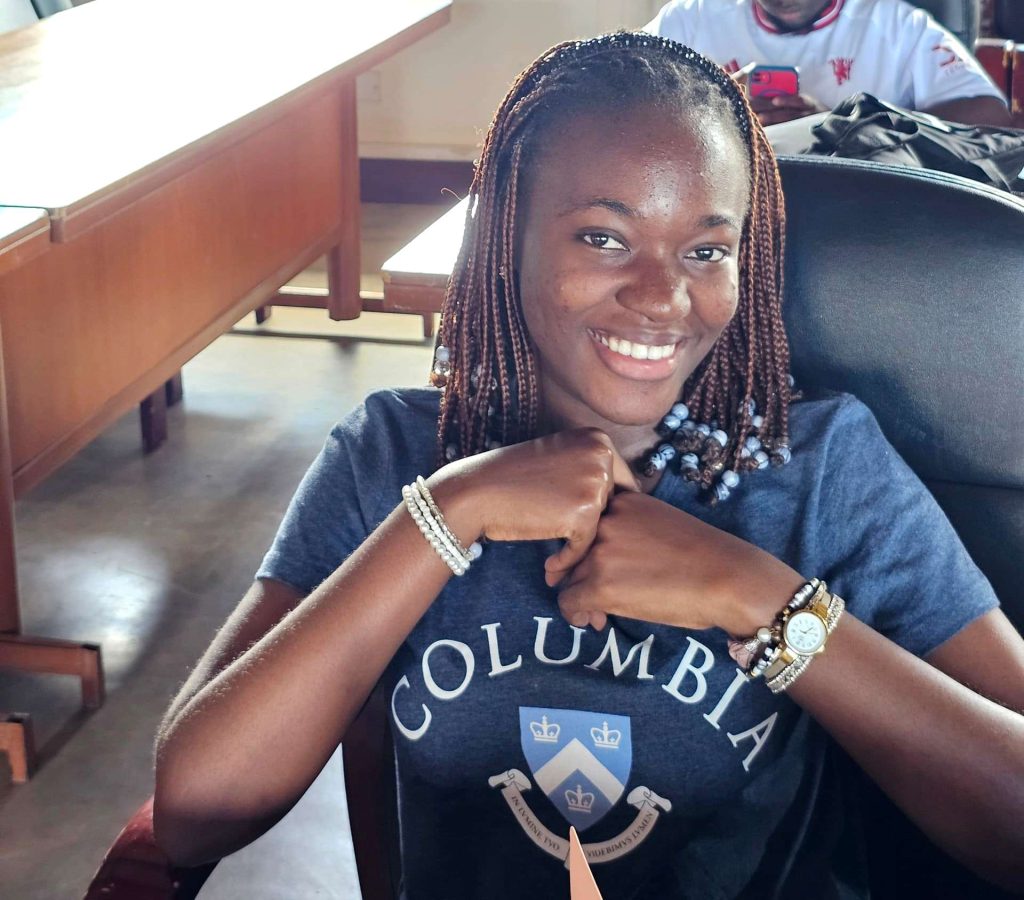
One of the international student leaders, Mr. Harrison Igwe expressed enthusiasm for organizing activities that promote unity within the international student community at Makerere University. The goal of the activities, he said, is to enhance camaraderie and strengthen support networks among international students.
General
Dr. Martin Aliker – Celebrating A Life Well Lived
Published
1 week agoon
April 16, 2024By
Mak Editor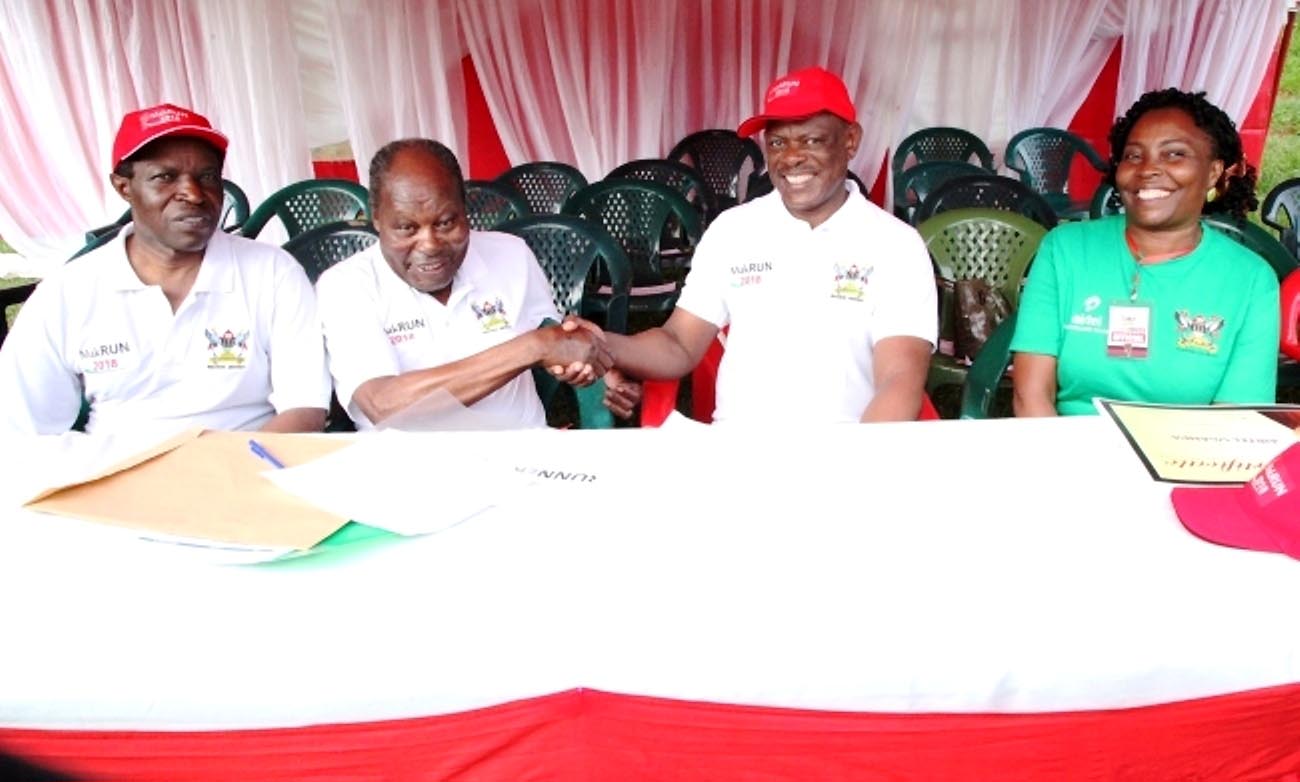
The Makerere University Council, Senate, Alumni and the entire students’ community has learnt with great sorrow of the death of your beloved head, Dr. Martin Aliker. Please accept our sincerest condolences during this trying time.
Dr. Aliker joined Makerere College then in 1948 and shortly thereafter received a scholarship to join Northwestern University, Illinois where he earned a Bachelor of Political Science. Being an ardent student, he also earned a Fulbright Fellowship at Northwestern University, and graduated with a Doctor of Dental Surgery, later becoming a Fellow of the Royal College of Dental Surgeons of the United Kingdom.
Dr. Aliker has throughout his long and well-lived life projected an enviable brand, reflective of a professional and hardworking gentleman who has excelled in all walks of life as a distinguished alumnus, scholar, influential business leader, entrepreneurial mentor, and one of Uganda’s and indeed Africa’s and the Commonwealth’s leading senior citizens.
The name Dr. Martin Aliker has stood the test of time as one attributable to dedicated service with impeccable integrity, tested and proven business acumen, making him a distinguished source of inspiration to both the young and old. It was therefore with great pride that Makerere University on 17th July 2014 appointed him as the Chairperson of the pioneer Board of Trustees in charge of the Makerere University Endowment Fund (MakEF).
Under his stewardship, the Inaugural Board had at the end of their term in 2019 grown MakEF’s onshore fund from nothing in 2014 to UGX 1.5 Billion, while the offshore fund was valued at 1.5 Million GBP.
We remain forever thankful to God for the gift of Dr. Martin Aliker’s inspirational life and pray that the good Lord will comfort you his beloved and rest his soul in eternal peace.
Umar Kakumba (PhD)
AG. VICE CHANCELLOR
Related articles
Dr. Martin Aliker to Prof. Maggie Kigozi: The Legacy of MakEF
Bidding Farewell to Pioneer MakEF Board of Trustees
MakRun 2019 Raises Over UGX100Million
Mak receives property: NIC hands over Plot 2A Kampala Road
MakRun2018: The Push Towards a Centre that Reflects Dynamism of the 21st Century Student
MakRun2017 Gives Over 190m Roaring Start to Students Centre Project
Thousands Run for Mak Students’ Centre
Fulbright celebrates 70years of partnership and achievements
Makerere Inaugurates Endowment Fund Board of Trustees
Ngugi revitalizes Pan-Africanism as Mak honours Nyerere
Trending
-
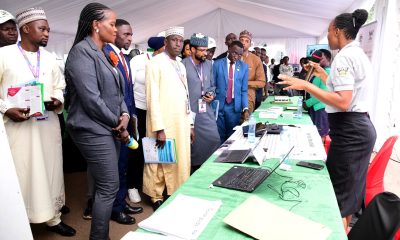
 Computing & IS6 days ago
Computing & IS6 days agoFree Course: Introduction to Data Science
-
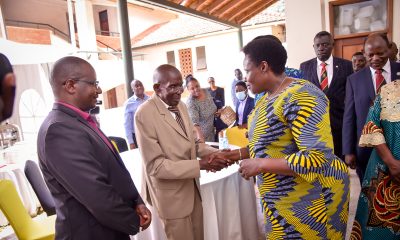
 General1 week ago
General1 week agoProf. Justin Epelu-Opio, Our Longest Serving DVC Rests
-
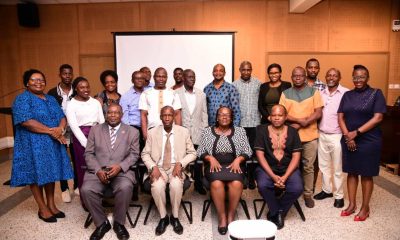
 Education4 days ago
Education4 days agoGovernment Asked to Make Fine Art Compulsory in Secondary Schools
-
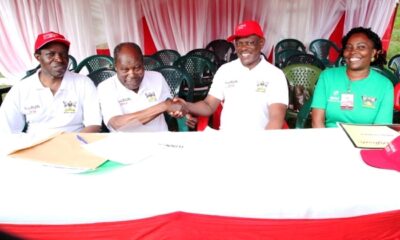
 General1 week ago
General1 week agoDr. Martin Aliker – Celebrating A Life Well Lived
-
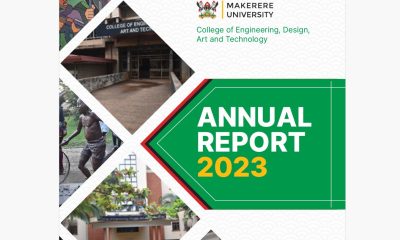
 Engineering, Art & Tech2 weeks ago
Engineering, Art & Tech2 weeks agoCEDAT Annual Report 2023
